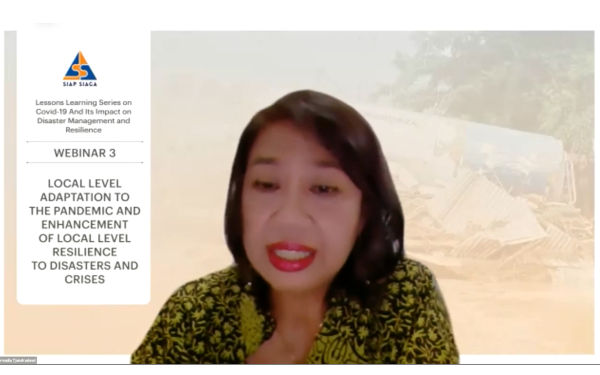
The COVID-19 pandemic has brought devastating impacts to all people around the world and halted various sectors that are now moving towards recovery. However, w hile still fighting the pandemic, regions and cities in the world also have to face non-pandemic related disasters, which resulted in many casualties and losses.
On 18th June 2021, SIAP SIAGA hosted an online webinar session titled “Local Level Adaptation to the Pandemic and Enhancement of Local Level Resilience to Disasters and Crises”. It is the third webinar of the Lesson Learned Series on COVID-19 and Its Impact on Disaster Management and Resilience. The webinar’s aim was to discuss and sharing local experiences on managing non-pandemic disasters, and how local governments and its representatives can better coordinate with each other to do so during the COVID-19 pandemic.
Prof. Daniel Kameo, Ph.D as the executive advisor to the Governor of East Nusa Tenggara shared the experience when East Nusa Tenggara was hit by Seroja cyclone. He said that the mobility restriction policy from the central government hindered the local governments’ mobility and coordination for the disaster relief program.
During that time, there were some concrete actions taken by the local government. First, they ordered government officials to give the command to all local leaders to better assist and prepare their communities for potential disasters, particularly in the challenging COVID-19 environment we are still living in. The government officials’ strong and empathetic leadership was still needed to organize all stakeholders and lead local governments.
During his session, Prof. Daniel also acknowledged how local leaders have the advantage of identifying risk differences among vulnerable groups in their communities, and effective communication needs to be ensured in efforts of disaster relief, while also building local resilience. Then the provincial government has asked the central government not to declare East Nusa Tenggara as a disaster region. This action was taken because East Nusa Tenggara rely on the tourism industry as income and any bad reporting will further affect the tourism industry which is already affected by the pandemic.
He also said that during mobilization restrictions the local communities also play an important role in delivering aids. The local communities that were not affected acted as front liners in helping affected communities.
Although he admitted the disaster response in East Nusa Tenggara was quite good during this pandemic, he asked the central government to put more priority in disaster mitigation. This mitigation effort can take in many forms, such as investing in earthquake resistant materials and design, developing databases of vulnerable residence areas, and giving knowledge and information in disaster mitigation to people living in high-risk areas. Investing in mitigation will save more people and prevent heavy infrastructure loss.
In Thailand, the country also had to deal with drought and forest fires. Ms. Pannapa Na Nan, Director of International Cooperation Section from Department of Disaster Prevention and Mitigation of Thailand shared how her country maximizes local participation in disaster risk management.
There are 18 disaster centres spread across Thailand with 1 regional centre covering 3 to 5 provinces. Each centre is equipped with a machine for an emergency response. In the time of disaster, the whole society will be involved under the command of the provincial government. Furthermore, local volunteers which are consisted of health and civil defense volunteers were dispatched to reach people to give help and provide official information.
When it comes to mitigation efforts, these regional centres provide capacity building for people, especially for local volunteers. During COVID-19 pandemic crisis, local volunteers have a role in tracking and tracing, and also providing correct information to help ease people from overwhelming information.
Dr. Bernadia Irawati Tjandradewi, Secretary-General of UCLG ASPAC, said that the pandemic has definitely shifted the paradigm in leadership, such as how local leaders can change up internal coordination and with other stakeholders in the context of disaster management. In doing so she agreed that local governments are more capable in recognizing vulnerable groups to be put as priority. She also shared how the pandemic changed some of the practices of disaster risk management of local governments such as of responses and recovery plan, advancing the knowledge hub, and open dialogue with people between central and local governments.
She further explained by giving examples from the above point. First, during a pandemic, the government is using public facilities as shelters. This urged the government to update their data and capacity on data collection since people are now relying on information from the government regarding shelter availability. Second, the pandemic triggered priorities in policies with refocusing programs and allocating budgets for disaster management. Third, the pandemic also triggered crisis preparedness.
In this case, local governments must be prepared with logistic resources and the mobilization of resources and support. Fourth, it is important for local governments to have effective communication in conveying health protocols to its citizens. With effective communication, citizens’ compliance level to health protocol will most likely increase.
To sum up, in building a disaster-resilient region knowledge in disaster mitigation is the key. One of activities to build knowledge in disaster mitigation that was shared by Ms. Pannapa Na Nan is providing people with knowledge and equipment through capacity building training and knowledge transfer. On the other hand, Prof. Daniel Kameo hoped that disaster mitigation can be included in the school curriculum, as early as possible to raise awareness since early childhood. Further, to complement the efforts from the local government, UCLG ASPAC also provides training for local governments in building capacity.
By KM Team

Source: www.uclg-aspac.org


